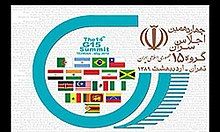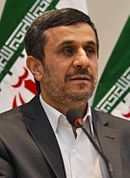14th G-15 summit
| 14th G-15 Summit | |
|---|---|
 | |
| Host country | Iran |
| Dates | May 15–17, 2010 |
The Fourteenth G-15 summit was held in Tehran, Iran on May 17–20, 2010. The bi-annual summit agenda of the Group of 15 (G-15)[1] encompassed a range of issues.[2]
The gathering brought together leaders, representatives and policymakers from non-aligned nations. African G-15 nations are Algeria, Egypt, Kenya, Nigeria, Senegal, and Zimbabwe. Those from Asia are India, Indonesia, Iran, Malaysia, and Sri Lanka. Latin American G-15 nations include Argentina, Brazil, Chile, Jamaica, Mexico, Peru and Venezuela.[3]
Overview
[edit]The Group of 15 was established at the Ninth Non-Aligned Movement summit in Belgrade, Yugoslavia in September 1989. The name of this group is unchanging, but its composition has expanded to 18 countries.[3]
The G-15 is composed of countries from Africa, Asia, North America and South America. These non-aligned nations joined to create a forum to foster cooperation and develop information which can be presented to other international groups, such as the World Trade Organization and the Group of Eight. The G-15 nations have a common goal of enhanced growth and prosperity. The group aims to encourage cooperation among developing countries in the areas of investment, trade, and technology.[3]
Meeting independently in Tehran, ministers from Brazil, Iran and Turkey negotiated an agreement on principles designed to revive a stalled nuclear fuel-swap deal backed by the United Nations.[4]
Leaders at the summit
[edit]Those nations represented at the summit were Algeria, Argentina, Brazil, Chile, Egypt, India, Indonesia, Iran, Jamaica, Kenya, Malaysia, Mexico, Nigeria, Peru, Senegal, Sri Lanka, Venezuela, and Zimbabwe. The G-15 membership has expanded to 18 countries, but the name has remained unchanged.[5]
The leaders of G-15 nations are core contributors in summit meetings,[6] but only some of the heads-of-state were at the Teheran event:
| Government leaders | ||
| President | Abdelaziz Bouteflika[7] | |
| President | Luiz Inácio Lula da Silva[7] | |
| President | Mahmoud Ahmadinejad[7] | |
| President | Abdoulaye Wade[7] | |
| President | Mahinda Rajapakse[7] | |
| Prime Minister | Recep Tayyip Erdogan[7] | |
| President | Robert Mugabe[8] | |
| represented by its permanent representative in Geneva[7] | ||
| represented by the president's special envoy [7] | ||
| represented by the Minister of Investment[9] | ||
| represented by its Foreign Minister.[7] | ||
| represented by the president's special envoy and the Minister of Industries[7] | ||
| Vice-president | Kalonzo Musyoka[10] | |
| represented by the Deputy Minister of Finance[2] | ||
| represented by its Ambassador to Iran[7] | ||
| represented by its Foreign Minister[7] | ||
Guest participants
[edit]- Belarus was represented by its deputy Vice-president [7] The Russian ambassador to Iran was in attendance.[7]
Priorities
[edit]The G-15 perceive an ongoing need to expand dialogue with the G8 and with the G20. The G-15 want to help bridge the gap between developing countries and the more developed and industrialized nations. The fact that some of the G-15 are simultaneously members of these other forums is expected to be helpful.[3]
Issues
[edit]G-15 nations are united by shared perceptions of global economic issues; and the G-15 provides a structure for working out common strategies for dealing with these issues.[11] For example, the G-15 opposes using the international economic and financial systems as political instruments. The group condemns the use of coercive economic measures or laws against developing countries.[12]
G-15 nations have joined in hopes of escaping from the more polemical atmosphere in other multi-national groups and organizations, such as the Group of 77 (G-77). For example, the 14th G-15 summit called for reform of Bretton Woods institutions and examining alternate sources of financing for the developing world.[12]
Schedule and Agenda
[edit]The summit was a venue for three-way talks between Turkish Prime Minister Erdogan and Brazilian President Lula da Silva and Iranian President Ahmadinejad. Their negotiations led to the announcement of a program of exchange in Turkey of Iran's low-enriched uranium for nuclear fuel processed abroad.[13] The announcement of a diplomatic break-through was met with scepticism in Western capitals.[14]
The summit focused on the importance of cooperation in facing the current challenges of food, energy, climate change, health and trade. The G-15 agenda included discussions of the Doha Round, intellectual properties and the global financial crisis.
The chairmanship of the G-15 passed from Iran to Sri Lanka at the end of the summit; and Sri Lanka will host the next scheduled group meeting in Colombo, the 15th G-15 summit in 2012.[3]
See also
[edit]Notes
[edit]- ^ The official website Archived 2017-09-12 at the Wayback Machine adopts the "G-15" orthography (with a hyphen) in order to distinguish an abbreviated reference to this group in contrast with other similarly named entities.
- ^ a b Bernama (Malaysian National News Agency): "Ahmad Husni Represents Malaysia At G-15 Summit In Tehran." May 18, 2010.
- ^ a b c d e Prematillake, Tharindu. "Lanka Heads Powerful G-15 Serving Collective Interests," Archived 2010-05-28 at the Wayback Machine The Nation (Colombo). May 22, 2010.
- ^ Barrionuevo, Alexei et al. "Brazil and Turkey Say a Nuclear Deal With Iran Is Near,"New York Times. May 17, 2010; "Brazil’s Iran Diplomacy Worries U.S. Officials," New York Times, May 14, 2010; retrieved 2011-08-26
- ^ Afrasiabi, Kaveh L. "Cool G-15 heads take the heat," Asia Times (Hong Kong). May 15, 2010; retrieved 2011-08-26
- ^ Rieffel, Lex. "Regional Voices in Global Governance: Looking to 2010 (Part IV)," Archived June 3, 2010, at the Wayback Machine Brookings. March 27, 2009.
- ^ a b c d e f g h i j k l m n FARS News Service: "G-15 Summit Opens in Tehran," Archived 2012-03-01 at the Wayback Machine May 18, 2010.
- ^ Farai Dzirutwe, Farai. "Zimbabwe: President Arrives in Iran." The Herald (Harare). 17 May 2010.
- ^ Kotb, Mesbah and Mohamed Abdel Atty/ "Mubarak: Finance Crisis Shows Need for Global System," Al-Masry Al-Youm. May 18, 2010.
- ^ "Kalonzo Decries Heckling At 'Yes' Campaign," The Nation (Nairobi). May 16, 2010.
- ^ Chauhan, Sandeep. Demand for New International Economic Order, p. 129., p. 129, at Google Books
- ^ a b Dikshit, Sandeep. "G-15 Deplores Imposition of Sanctions on Developing Countries," The Hindu (Chennai). May 19, 2010.
- ^ "Iran 'Agrees' Nuclear Fuel Swap," Aljazeera. May 17, 2010.
- ^ Sanger, David and Michael Slackman. "U.S. Is Skeptical on Iranian Deal for Nuclear Fuel," New York Times. May 17, 2010.
References
[edit]- Chauhan, Sandeep. (1997). Demand for New International Economic Order. New Delhi: MD Publications. ISBN 9788175330276; OCLC 222017407

